UNESCO AND THE ISSUE OF CULTURAL DIVERSITY Review ... - ITI
UNESCO AND THE ISSUE OF CULTURAL DIVERSITY Review ... - ITI
UNESCO AND THE ISSUE OF CULTURAL DIVERSITY Review ... - ITI
Create successful ePaper yourself
Turn your PDF publications into a flip-book with our unique Google optimized e-Paper software.
culture that man expresses himself, becomes aware of himself, recognises<br />
his incompleteness, questions his own achievements, seeks untiringly for<br />
new meanings and creates works through which he transcends his<br />
limitations’ (p. 39). This more sophisticated view of culture as a universal<br />
faculty, rather than a rigid set of practices, allows the maximum potential for<br />
flexibility and transcendence. It builds the ideas of renewal, reevaluation, and<br />
critical choice into the definition of culture itself, preempting the criticism that<br />
cultural particularism cari become a bulwark against intercultural sharing and<br />
solidarity. Further clauses in this Declaration reflect the more traditional view of<br />
culture as highly specific, thereby preventing the more sophisticated notion of<br />
culture as critical evaluation from becoming SO open and non-specific that it<br />
loses its relevance and potency. This constant attempt to balance affirmation<br />
with openness, a central pillar of the approach to culture crystallized in this<br />
document, represents an important counterweight to the excessive politicization<br />
of cultural identity at the expense of a search for common values. Finally, the<br />
realization that cultural diversity needs to be managed within societies<br />
themselves, and the recognition that no culture cari live isolated in today’s<br />
interdependent world, underlies this Declaration and its principles.<br />
The Medium-Term Plan for 1984-89 followed up on the theme of<br />
specificity and universality. It affirmed that ‘each cultural heritage is part of<br />
the common property of mankind’ (p. 228), suggesting the importance for all<br />
cultures of preserving and respecting each one of them. A more detailed<br />
study was also envisioned on this general topic: ‘the fifth subprogramme<br />
(Studies of the specificity and universality of cultural values) involves studies<br />
and research aimed at developing the concept of cultural value and of the<br />
specificity of cultural values; shedding light on the conditions for achieving<br />
balance between the affirmation of identity and the imperative requirements<br />
of living together in harmony and the mutual enrichment of cultures;<br />
providing a clearer definition, in methodological terms, of a set of common<br />
aesthetic and ethical values that are widely shared and establishing the<br />
conditions for their recognition by individuals, societies and the international<br />
community’ (p. 231). A recognition of the importance of these issues was the<br />
first step towards developing mere thoughtful and useful approaches to<br />
them.<br />
On a very concrete level, the situation of apartheid focused attention<br />
on the question of diversity and equality. As the Medium-Term Plan noted,<br />
the July 1950 Declaration on race ‘showed that racism not only had the effect<br />
of denying equality to certain populations but also called into question the<br />
unity of the human race’ (p. 243). The Plan highlighted that ‘the basic issue<br />
raised by the deliberate policy of apartheid is the choice between the image<br />
of man which it is <strong>UNESCO</strong> task to defend on behalf of the international<br />
community and the image which results from that policy’ (p. 244) and that<br />
‘apartheid represents the logical culmination and final stage of colonialism’<br />
(p. 253). The politicization of cultural identity as a potential liberating factor<br />
within societies themselves was illustrated clearly and dramatically by these<br />
condemnations of apartheid policies, showing the connection between<br />
identity and human rights that had been theorized in <strong>UNESCO</strong> documents.<br />
15



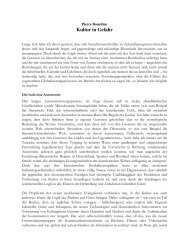
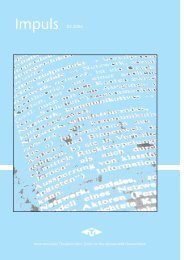
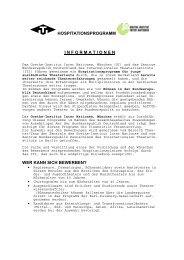
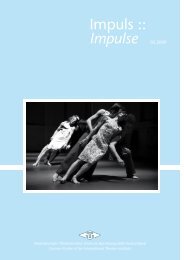
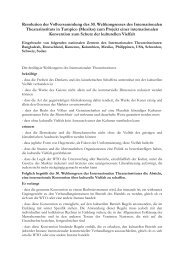
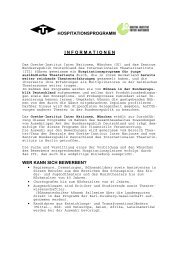
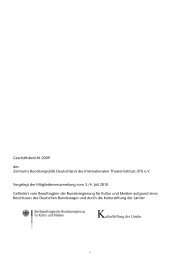
![Geschäftsbericht 2010 [pdf 2 MB] - ITI](https://img.yumpu.com/4380475/1/184x260/geschaftsbericht-2010-pdf-2-mb-iti.jpg?quality=85)